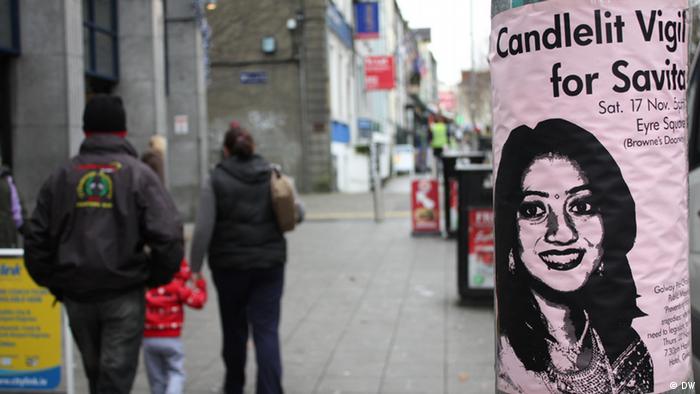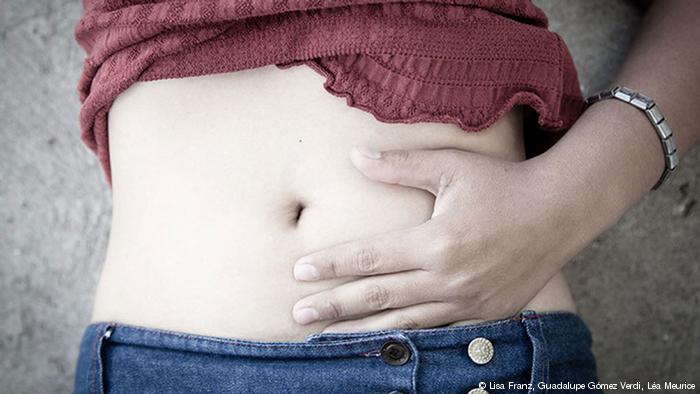A murder masked by religion?

The hardest thing for a mother is to lose her child. The pain caused is much greater than that caused by childbirth. Savita Halappanavar was brave enough to accept that she was losing her baby. 31-year-old Savita, a dentist by profession, went to a hospital in Ireland complaining of back pain. After being told that she was miscarrying, she sought medical termination of her pregnancy. The doctors refused because “Ireland is a catholic country.” Savita was 17 weeks pregnant. She died of septicaemia a week later.
Doctors denied abortion because the foetal heart was still beating. Savita went through unbearable pain for three days . By then, the infection had spread inside Savita’s body. Dr Jennifer Gunter, a world renowned obstetrician believes that infection may occur at anytime during pre-term labour, premature rupture of the membranes, or when advanced premature cervical dilation occurs (one of the reasons that would have brought Savita to the hospital). Although, the duty of doctors is to make every possible efforts to save lives but in this case they failed.
Under an 1891 statute, abortion is banned in Ireland. In 1992, a Supreme Court judgement demanded that abortions should be allowed when pregnancy is life threatening. The five governments since then have not brought any legislation forward. Although terminations are allowed at present, but doctors complain that there is a lack of clarity over when they can or cannot perform abortions.
The Irish medical council rule on termination of pregnancy says, “In current obstetrical practice, rare complications can arise where therapeutic intervention (including termination of pregnancy) is required at a stage when, due to extreme immaturity of the baby there may be little or no hope of baby surviving. In these exceptional circumstances, it may be necessary to intervene to terminate the pregnancy to protect the life of the mother, while making every effort to preserve the life of the baby.”
The doctors, in this case, valued the fading heart beats of a 17-week-old foetus over the life of a pregnant woman. They said they were following the law of their country. As per an amendment to Ireland’s constitution in 1983, “The embryo, even at the point of conception, is an Irish citizen enjoying the full rights of every man, woman and child living in the republic.” There is a big no to abortions in Ireland. But that doesn’t mean that they don’t happen at all. A good number of Irish women travel to England every year to terminate pregnancy. Unfortunately, Savita had no time to travel to England.
The question is, should the Irish government loosen up a little on abortion laws? Yes, they should. For Taoiseach (the head of government in Ireland) Enda Kenny, “Abortion is not of priority” to his government. Does he mean that the health of women is not a priority? Is he not aware that there are women suffering because of this one law? Doesn’t he know that girls who become pregnant at young age can’t handle the burden of motherhood? Rape victims are forced to endure pregnancy. In case of very young girls it becomes more difficult because Irish law does not allow children to leave the country. So they can’t even travel abroad to terminate pregnancy.
Just about two months back, 140 Irish medical professionals participated in the International Symposium on Excellence in Maternal Healthcare where they declared that the prohibition of abortion does not affect, in any way, the availability of optimal care to pregnant women. Now after Savita’s death, this consortium of doctors must be feeling triumphant. The mother died, the foetus died too, but there was no abortion atleast.
Ireland has hardly seen thousands of people protesting on streets, like it was seen this time after Savita’s death. The people on streets are divided into two groups, pro-life (anti-abortion) and pro-choice. A pro-life group has issued a statement which mentions that its thoughts and prayers are with Savita’s family and insisted that there were very clear medical council guidelines which state that doctors will be struck off if they perform terminations. They have said that Ireland’s ban on abortion does not pose a threat to women’s lives citing “Obstetricians and Gynaecologists who care for Irish women every day”. “In fact, without abortion, Ireland is one of the safest places in the world for a mother to have a baby, according to the United Nations,” they said.
Pro-choice protestors are demanding action from the Irish government. These groups want change in Irish abortion laws. They have accused the government of moral cowardice.
It is good to be religious. Religion teaches us to value human life. Humanity is placed above everything. But, haven’t the Irish doctors been inhuman to Savita? It is shameful that a woman died after repeatedly begging for abortion. There is, of course, a need to change the abortion law in Ireland to avoid another woman from dying a preventable death. Many women may not have resources or like Savita, enough time left to travel to England.
Author: Ronaq Zahoor
Editor: Manasi Gopalakrishnan






